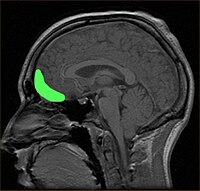
Photo from wikipedia
Abstract This study investigated the effects of anger on intertemporal choice from three dimensions: state anger, trait anger, and the behavioral approach motivation system (BAS). Also, the study tested whether… Click to show full abstract
Abstract This study investigated the effects of anger on intertemporal choice from three dimensions: state anger, trait anger, and the behavioral approach motivation system (BAS). Also, the study tested whether a delayed larger (LL) reward is risky compared to an immediate smaller (SS) reward. Participants (N = 160) were randomly assigned to either the anger or the neutral condition. Results showed that people with higher BAS scores tended to prefer a SS reward over a LL reward when they were in a temporarily angry mood. Furthermore, results presented an interactive effect between trait and state anger on choice preference for SS rewards in the anger condition. In addition, a negative relationship was shown between the individuals' preference for SS rewards and the individuals' preference for risky gains in decisions under uncertainty, which indicated that a future reward in intertemporal choice is risky. Both the effect of the BAS and the interactive effect between trait and state anger were explained from the perspective of risk preferences. These results suggest that both situational and biological-based affective information shape decisions and that the perspective of risk preference is the underlying mechanism for the impacts of emotions on decision-making.
Journal Title: Personality and Individual Differences
Year Published: 2017
Link to full text (if available)
Share on Social Media: Sign Up to like & get
recommendations!